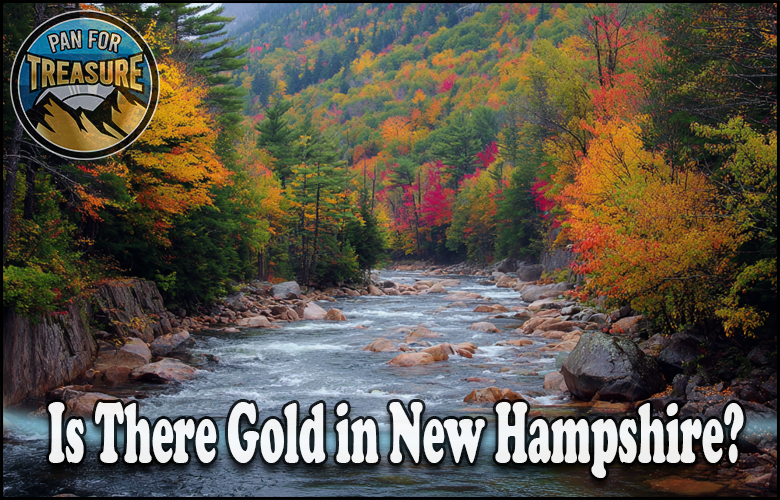
Disclosure: This Post Contains Affiliate Links; We earn a commission on purchases.
Have you ever wondered if there is gold in New Hampshire?
Well, the answer is yes!
While the state may not have the same abundance of gold as other parts of the country, small quantities of gold have been found in New Hampshire’s bedrock and in the gravels at the bottom of some streams.
Gold in the bedrock typically occurs in narrow mineral-rich streaks called veins.
This has led to a history of hard rock mining in the Bath area during the 1860s.
Placer deposits of gold can also be found in stream gravels, and methods such as panning and dredging are used to separate the gold from the gravels.
Key Takeaways:
- New Hampshire has small quantities of gold in its bedrock and stream gravels.
- Hard rock mining was historically conducted in the Bath area.
- Placer deposits of gold can be found in stream gravels.
- Methods such as panning and dredging are used to extract gold from gravels.
- While gold may not be abundant, prospecting in New Hampshire can still be an enjoyable recreational activity.
Gold Prospecting in New Hampshire
New Hampshire offers exciting opportunities for gold prospecting, mining, and exploration. The state is known for its potential gold-bearing areas, including placer deposits, quartz veins, and metamorphosed conglomerate. If you’re eager to try your hand at finding gold, there are several promising locations to explore.
Popular Gold Prospecting Spots
- The Ammonoosuc River and its tributaries, such as Wild Ammonoosuc River and Notch Brook, are well-known hotspots for gold prospecting. These waterways have yielded some excellent finds over the years.
- The Baker River, Salmon Hole Brook, Indian Stream, and Perry Stream are also worth investigating. These areas have reported gold findings and present exciting opportunities for prospectors.
While finding large gold nuggets in New Hampshire may be rare, don’t be discouraged. Fine placer gold can still be discovered in many streams throughout the northern and western parts of the state. With patience and persistence, you might just uncover a valuable treasure.
Remember to research specific regulations and obtain any necessary permits before engaging in gold prospecting activities. The New Hampshire Department of Environmental Services can provide detailed information on permits and regulations, ensuring you are in compliance with the law.
Pro tip: Look out for exposed gravel bars in the recommended areas – especially during periods of low water levels. These can be lucrative spots for finding gold deposits.
So, grab your gold pan and head out to the rivers and streams of New Hampshire. You never know what golden surprises await!
Regulations and Permits for Gold Prospecting in New Hampshire
Prospecting for gold in New Hampshire requires knowledge of the state’s regulations and permits. While gold panning is allowed year-round in most areas, the use of larger equipment, such as sluice boxes and suction dredges, requires a special permit. Miners are required to obtain a permit to operate a minimum impact small motor dredge for recreational mining of gold and other minerals.
It is important to obtain permission from landowners before entering private property for prospecting activities. The New Hampshire Department of Environmental Services can provide detailed information on permitting and regulations.
Where to Find Gold in New Hampshire
Gold can be found in various locations throughout New Hampshire, offering exciting opportunities for gold prospecting and mining enthusiasts. Here are some notable areas where you can try your luck:
1. Ammonoosuc River and Tributaries
The Ammonoosuc River, along with its tributaries like the Wild Ammonoosuc River and Notch Brook, is known to contain placer gold. These waterways have witnessed successful gold findings and continue to be popular among prospectors.
2. Mill Brook
Mill Brook, which flows into the Ammonoosuc River near Landaff, is another promising area to search for gold. Prospectors have reported the presence of gold deposits in the gravels of this stream.
3. Baker River
The Baker River and its surrounding streams offer potential opportunities for gold prospecting. Exploring the gravel bars along the banks of the Baker River can yield favorable results.
4. Salmon Hole Brook
Salmon Hole Brook, located in the pristine natural beauty of New Hampshire, has known gold findings. Panning in this area can potentially lead to discovering fine placer gold.
5. Indian Stream and Perry Stream
Indian Stream and Perry Stream are other water bodies where gold has been found. These locations are worth exploring, particularly during low water levels when exposed gravel bars increase the chances of discovering gold.
6. Swift Diamond River
The Swift Diamond River, known for its scenic beauty, is also a potential spot for finding gold in New Hampshire. Prospectors have reported successful gold discoveries in this area.
Remember, gold prospecting and panning can be both adventurous and rewarding. Always obtain permission from landowners before exploring private property, and make sure to follow the regulations and obtain any necessary permits for your prospecting activities.
Now that we have explored the locations where gold can be found in New Hampshire, let’s discuss the regulations and permits required for gold prospecting in the next section.
Conclusion
Yes, there is gold in New Hampshire. While the state’s gold deposits may not be as plentiful as those in other parts of the country, small amounts of gold can still be found in bedrock and stream gravels across the state. This opens up opportunities for gold prospecting, mining, and panning in New Hampshire.
For those interested in exploring the possibility of finding gold, New Hampshire offers several locations that have shown promise. The Ammonoosuc River and its tributaries, such as Wild Ammonoosuc River and Notch Brook, are known for the presence of placer gold. Other areas worth exploring include the Baker River, Salmon Hole Brook, Indian Stream, and Perry Stream. While large gold nuggets are rare, patient prospectors can still uncover fine placer gold in many streams throughout northern and western New Hampshire.
Before embarking on any gold prospecting adventures, it is essential to familiarize yourself with the state’s regulations and obtain the necessary permits. While gold panning is generally allowed year-round, the use of larger equipment such as sluice boxes and suction dredges requires a special permit. It is also important to seek permission from landowners before entering private property for prospecting activities. By adhering to these regulations, you can ensure a responsible and enjoyable gold hunting experience.
References
- https://www.des.nh.gov/sites/g/files/ehbemt341/files/documents/2020-01/geo-1.pdf
- https://americangoldprospectingadventures.com/where-to-find-gold/new-hampshire-gold-locations/
- https://raregoldnuggets.com/?p=309

Meet Ryan Conlon, the passionate owner and driving force behind Pan for Treasure.
With an unwavering love for the art of gold panning, Ryan has transformed his enthusiasm into a thriving community hub for fellow treasure seekers. [email protected]
A seasoned gold panning enthusiast, Ryan’s journey began with a simple pan and a dream, evolving into a deep appreciation for the history, geology, and thrill of uncovering precious metals.
Subscribe to Our Newsletter
